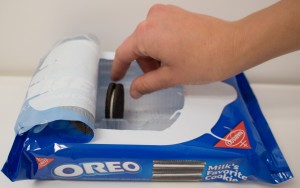
Oreos were found to be just as addictive as cocaine to rats in a study out of Connecticut College. The preliminary findings in the study have not been peer reviewed, and some are skeptical of the validity of these findings.
The press release from Connecticut College indicated eating the cookies activated more neurons in the pleasure center of the brain than the exposure to cocaine.
“Our research supports the theory that high-fat/high-sugar foods stimulate the brain in the same way that drugs do,” said Joseph Schroeder, director of the behavioral neuroscience program at Conneticut College in a press release.
Hal Miller is a BYU professor of psychology who noticed the correlational nature of this experiment.
“There was a shift in the animals’ behavior once the cookies became available,” Miller said. “As preference increased for Oreos, so did this brain activity. Now this may be an interesting observation, but it is certainly not enough to invoke a causal relationship.”
Miller said processed or enhanced foods appeal more than natural foods to the tongue and palate and said in a world where the variety of processed food is endless, people are at a definite disadvantage. However, naming these cravings an addiction may not be the best conclusion.
“The concept of addiction may cease to be useful if anything can become an addiction,” Miller said. “We need to be circumspect about how we use that term.”
Nathan Schilaty, a neuroscience Ph.D. student from Colorado, also said the concept of addiction could be more strictly defined, especially within the study.
“When it comes to addiction, it’s a pretty overused term because our brains are designed to experience pleasure,” Schilaty said. “Those drives are for our survival.”
An addictive state means actually changing the way the brain functions, according to Schilaty. Processed foods have no data to show they are actually making physical changes to the brain.
“When someone says they’re addicted to potato chips, they’re really saying they find potato chips pleasureable,” Schilaty said. “They are not actually changing the neurobiology and how the neurons wire and fire.”
If Oreo cookies caused the same kind of addiction as cocaine or meth, a person would be unable to function and live a normal life without them, according to David Hedges, a biochemistry Ph.D. student from Utah.
“It’s as if the need for the drug supersedes all other needs, including food and water,” Hedges said. “When we first saw this my thoughts were, if Oreos are as addictive, how come the whole nation can function without them? I love Oreos, but after eating them, I don’t feel the need to keep buying them everyday.”
The biggest red flag with this study was the authors published preliminary data that has not yet been peer reviewed.
“The scientific process is that you do everything you can on your own, and before you publish, you send them out to experts in your field,” Hedges said. “They didn’t do that.”




